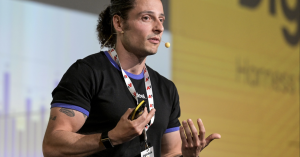Pluria is a remote & hybrid work solution that helps companies keep their distributed teams connected and engaged by giving them access to nearby workspaces. The start-up was founded in 2020 and in May 2023 it raised a $2M seed round to expand even more. We’ve talked to the founders, Andrei Cretu and Gabriela Draghia, about their very outside of the box approach of expanding internationally to Latin America as an early-stage start-up, and their plans for the future.
Where do we find Pluria today? Tell us more about the latest developments of the company.
Andrei: We are a distributed team of 25 people, half of which are in Europe, and the other half in Latin America, and we are living the dream of building a new product and using it to have a better work experience, to get together in different spaces, to have lunch with the team or use it individually.
In Pluria, we are firm believers in the power of in-person collaboration and flexible work models. This is the hybrid work dilemma: can you have both of the above, without sacrificing the flexibility that is valued so much today? We think it is possible and companies can have teams that are productive, engaged, collaborate better, meet in the physical space and at the same time the companies can expand the HQ from one single space to a multitude of offices their employees can access anytime they want.
And this space is getting larger every day: we are now present in 13 countries, mainly LatAm, our main market, that includes countries like Mexico, Colombia, Brazil, Argentina, Chile, Peru, and now Uruguay. We are also present in Europe, Iberia – Spain and Portugal – and in our home country, the place where the magic happens and everything started – the Balkans, in Romania and Bulgaria.
Why did you decide to expand to LATAM? What factors led to this decision?
Andrei: I don’t know of any start-up that actually took this step so early, and I will point out a few factors.
Because of my past start-up, 7card, now a part of GymPass, I got a bit closer to seeing the opportunities there because GymPass is the global leader as a fitness subscription model and they are originally from São Paulo, Brazil. As I was phasing out from my old start-up, I knew some people in the region and got to know it better.
There are far too many instances when founders, even today, in a world where technology has zero delivery costs, think of going international and only think in terms of geographic proximity. But if you’re in a market where the services are distributed via the Internet, then you should think of the globe as like an empty blank canvas, and really think of the addressable market, how big that is, how big is the pain point that you’re solving.
We took into consideration any particularities that might help build some competitive product there, such as the fact that we speak Spanish reasonably well.
Gabriela: I’d been exposed to LatAm only as a tourist, and it was an emerging market 10 years behind Eastern Europe, and more than 10 times bigger.
And what we discovered later on was the fact that it’s not just an emerging market with a lot of opportunities, but it’s also the territory of recruitment for US companies, with a lot of people being hired remotely, on the same timezone and with lower costs. Working remotely when you are living with a multi generation family in the same location can be challenging.
After 2 years of operating in this market, can you share some Pluria achievements in LATAM?
Andrei: Three months down the road after launching in Colombia, not only did we have a fairly solid network of spaces, which is kind of a hygiene element for us, but we already had the first client.
What happened and led us from having operations in Colombia to where we are today is that our clients started opening new locations throughout LatAm and encouraged us to extend to other cities as well.
It’s a healthy way of expanding because we are going after the locations that are relevant to our clients now and that will eventually become relevant to other clients as well because there’s a trend of long term companies operating in other markets. Now we can proudly say to companies that we are a single interface for remote teams across all of Latin America, which is a very, very strong statement.
What’s the benefit for companies? What is your USP?
Gabriela: There are other global players who chase vanity KPIs like ‘we have some 5000 spaces in the network’, when the reality is that they’ve massively affiliated a lot of spaces, some of which are not even available anymore.
We are proud to say that the likelihood of that happening in the Pluria network is extremely small. The fact that the network is curated means that the end user should have the best experience possible because they know when they go to the space that someone will expect them, will greet them and give them a tour if it’s the first time using this service, and so on.
What are the plans for the company for the next 18 months?
Andrei: We fell in love with the idea of solving a problem for companies whose teams are becoming increasingly more remote and experience the problem of reduced collaboration and engagement. Now it is the right moment to solve the hybrid work dilemma.
In terms of objectives, everything we build now is focused on solving this pain point for companies, to help them bring their teams together, to collaborate better no matter how distributed they are.
We’ll soon release a team engagement feature in the Pluria app that will allow our users to invite their colleagues or friends in a space in the network, connecting with other people in a natural way. This is how teams get together and we want to offer them the best tool to do it on their own terms, in spaces that fit their needs, because we strongly believe that the ideal hybrid work setup is unique to every company and we can help them find it.
Gabriela: One year ago we would have said something totally different about what Pluria does, but this is the magic of building a new solution: we are discovering new nuances every day about how our product can help companies and their employees and how we can have a positive impact on the lives of people. And that’s what drives us.
Pluria is also a way for us to help companies to reduce their carbon footprint. The ESG objectives that companies will have from January 2024 on reporting all initiatives that they take to reduce their carbon footprint and the way we align to them is also one aspect that we are proud of.
The sustainability aspect of our product was not in the spotlight in the previous years. Even if, at least in other regions, this was not something on top of the public agenda one or two years ago, we see it now as more and more important.
You’ve expanded to different regions and cultural spaces, and each of them comes with different particularities. Did you notice any different behavioral habits between these regions that you operate in?
Andrei: The differences that we see, like a preference for more meeting bookings in Latin America and one for individual desk bookings in Europe tell us that working together matters for people: even when you work individually, you want to have other people around you, like in a café or a coworking. If you want to be isolated you stay at home.
You mentioned that Eastern Europe and Latin America have one thing in common, and that is that US companies and big corporations open offices there. But do you find any similarities other than that, between the two markets?
Andrei: In terms of similarities, both regions are somehow emergent. Eastern Europe is trying to close the gap with Western Europe, Latin America is doing the same with the US. We share the common DNA of not being born in a royal family, but in difficult geographies, where we had to struggle. Maybe this explains why both regions have this desire to build something new.
Another similarity is that both regions have very smart people, well educated, and at relatively low cost, which is why we see a lot of the remote hiring corridors from Western Europe.
Gabriela: There is also the element of belonging, the professionals in these markets are extremely proud to work for US companies, I dare to say even our team is extremely proud to work for a European start-up, while the Romanians are typically quite emotionally attached to the companies for which they are working.
Andrei: Finally, I always explain that Latin America is Eastern Europe on steroids – same DNA, but bigger in terms of size and business opportunities.








